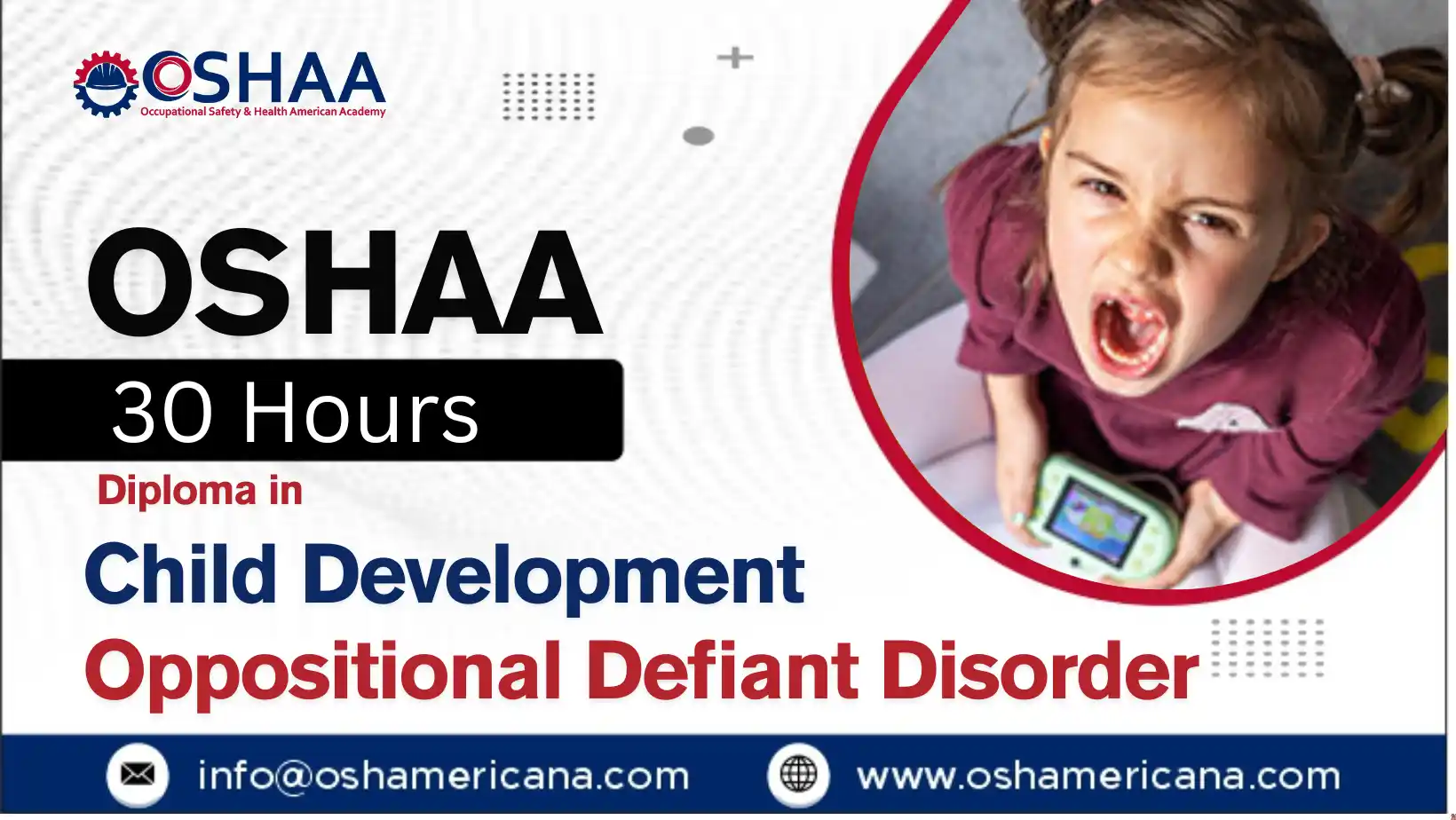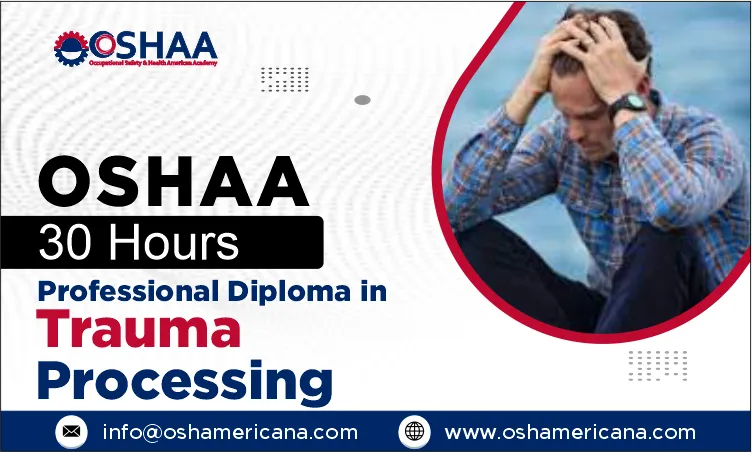Oppositional Defiant Disorder (ODD) is a recognised behavioural condition that affects children and adolescents, often manifesting as persistent patterns of anger, irritability, and defiant behaviour. The OSHAA 30-Hours Diploma in Child Development: Oppositional Defiant Disorder is a targeted training programme that provides in-depth knowledge and practical strategies for professionals working with children displaying such behavioural challenges.
ODD is characterised by frequent temper tantrums, refusal to comply with authority figures, and a generally uncooperative or hostile attitude. These behaviours often disrupt daily functioning at home, school, and in social settings. Understanding the root causes, developmental impact, and intervention strategies is crucial for parents, educators, and mental health professionals.
The OSHAA Diploma in Child Development: Oppositional Defiant Disorder is a concise, 30-hour course designed to equip participants with a comprehensive understanding of the disorder, its implications, and effective support strategies. The course covers developmental psychology, behavioural intervention methods, and approaches to working with children in both educational and clinical environments.
The OSHAA 30-Hours Diploma in Child Development: Oppositional Defiant Disorder offers a focused and practical approach to understanding and supporting children with challenging behaviours. Whether you are a professional working in education or social care, or a parent seeking better strategies at home, this course delivers valuable insights and tools that can make a real difference. Enrol today to take a proactive step in improving the lives of children affected by ODD and shaping more inclusive and supportive environments.
OSHAA 30-Hours Diploma in Child Development Oppositional Defiant Disorder
Study Units
Learning Outcomes
Foundations of Child Development and Behavioural Psychology (3 Hours)
- Understand key stages of child development and their influence on behaviour
- Identify major psychological theories relevant to childhood behaviour
- Recognise how development shapes emotional and social functioning
- Establish a foundation for assessing behavioural issues in children
Understanding Oppositional Defiant Disorder: Symptoms and Diagnosis (4 Hours)
- Identify the core symptoms and diagnostic criteria for ODD
- Understand the behavioural patterns associated with ODD in different age groups
- Explore the diagnostic process used by healthcare professionals
- Recognise the importance of early detection and accurate assessment
Developmental Causes and Risk Factors of ODD (5 Hours)
- Explore biological, psychological, and environmental contributors to ODD
- Understand the role of parenting style, trauma, and family dynamics
- Identify early warning signs and risk indicators in children
- Analyse how multiple factors interact to influence the onset of ODD
Differentiating ODD from Other Behavioural and Emotional Disorders (3 Hours)
- Distinguish ODD from conditions such as ADHD, Conduct Disorder, and Anxiety
- Understand overlapping symptoms and how to interpret them
- Learn to identify when referrals for specialist assessment are needed
- Explore comorbidity and its impact on treatment planning
Impact of ODD on Learning, Socialisation, and Family Dynamics (5 Hours)
- Understand how ODD affects academic performance and classroom behaviour
- Recognise the impact on peer relationships and social development
- Analyse the challenges faced by families and caregivers
- Explore the broader implications for school and community settings
Behavioural Intervention Techniques and Management Strategies (4 Hours)
- Learn evidence-based techniques for managing oppositional behaviour
- Apply consistent behavioural strategies in home and school environments
- Understand the principles of positive reinforcement and structured routines
- Develop behaviour support plans tailored to individual needs
Communication Skills for Supporting Children with ODD (4 Hours)
- Use effective and age-appropriate communication strategies
- Promote positive behaviour through clear and respectful dialogue
- Learn active listening and de-escalation techniques
- Strengthen relationships to support behavioural change
Working with Parents, Carers, and Families (2 Hours)
- Support parents in understanding and managing ODD
- Promote collaborative approaches between professionals and families
- Offer practical tools and resources for use at home
- Encourage consistency and continuity in behavioural support strategies
- Specialised Knowledge in Child Behaviour
Gain a focused understanding of Oppositional Defiant Disorder, its causes, impact, and effective management strategies, grounded in developmental psychology. - Enhanced Professional Competence
Equip yourself with practical skills and evidence-based approaches to support children with ODD in educational, clinical, or home environments. - Career Development
Strengthen your professional profile in education, childcare, youth work, counselling, or social services, with a recognised qualification aligned with UK standards. - Improved Behavioural Management Skills
Learn to apply effective behavioural intervention techniques and communication strategies that promote positive outcomes for children and families. - Better Collaboration with Families and Schools
Develop the ability to work confidently with parents, carers, and multi-agency teams to ensure consistent and supportive care. - Increased Empathy and Understanding
Build a deeper awareness of the emotional and social challenges faced by children with behavioural disorders, leading to more compassionate and informed practice. - Application of Real-World Case Studies
Engage with practical scenarios that reinforce your learning and prepare you for handling complex behavioural situations. - Foundation for Further Study
Use this diploma as a pathway to more advanced qualifications in child psychology, special educational needs, or therapeutic interventions. - Flexible Learning for Busy Professionals
Complete the course in just 30 hours, making it accessible for those with professional or personal commitments. - Positive Impact on Child Outcomes
Contribute meaningfully to the emotional wellbeing, academic progress, and social development of children exhibiting oppositional behaviour.
The OSHAA 30-Hours Diploma in Child Development – Oppositional Defiant Disorder (ODD) is designed for individuals who work with or care for children and wish to develop specialised knowledge and practical skills in managing challenging behaviour. This course is particularly suitable for:
- Teachers and Teaching Assistants
Education professionals seeking to better understand and support students with behavioural difficulties in the classroom. - Early Years Practitioners and Childcare Workers
Those working in nurseries, preschools, and childcare settings who want to respond effectively to signs of oppositional behaviour in young children. - Social Workers and Family Support Officers
Practitioners involved in safeguarding and family welfare, looking to improve their strategies for managing disruptive behaviour in a family context. - School Counsellors and Pastoral Staff
Staff supporting the emotional and behavioural needs of pupils, aiming to deepen their expertise in behaviour management. - Youth Workers and Mentors
Professionals working with adolescents in community or outreach settings who encounter behavioural challenges. - Parents and Carers
Individuals caring for children with behavioural difficulties who wish to gain a clearer understanding of ODD and how to support their child effectively. - Psychology and Education Students
Participants pursuing careers in child psychology, education, or therapy who want to build foundational knowledge in behavioural disorders. - Healthcare and Mental Health Practitioners
Professionals who interact with children in clinical or therapeutic settings and want to enhance their understanding of ODD within a developmental context.
This course requires no prior qualifications in psychology or child development, making it accessible to both professionals and individuals with a personal interest in child behaviour.







